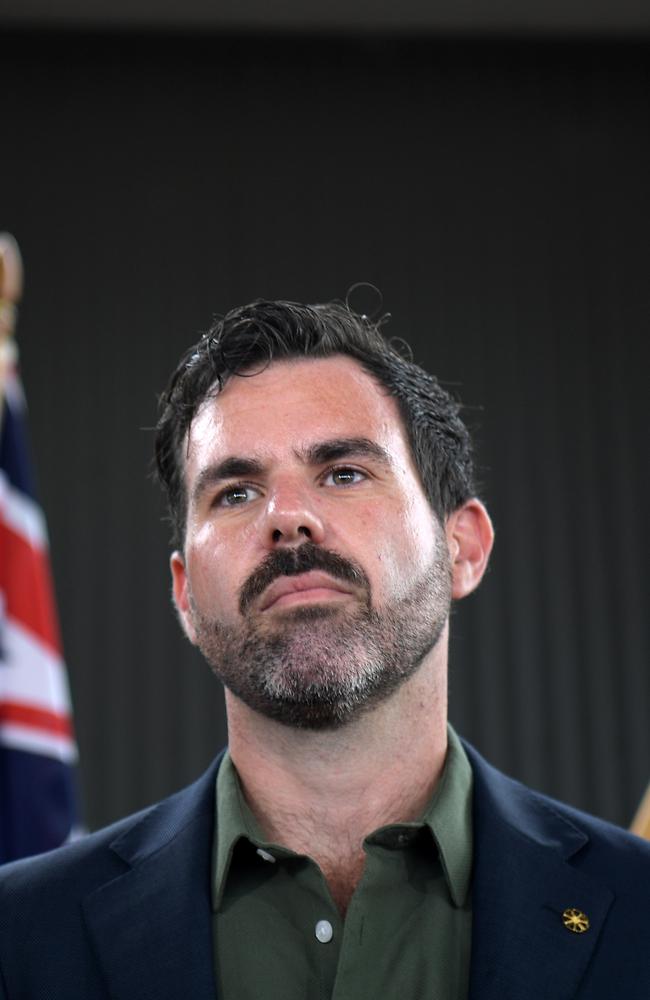NT Attorney-General Chansey Paech rules out policies looking to recreate the 2007 Intervention
NT government endorses community-led solutions to Alice Springs ‘crime crisis‘ to address root causes of crime spike and avoid an Intervention 2.0.
The 15-year legacy of government policies which disempowered and demonised Aboriginal communities, are a key factor to the current “crime crisis” of Central Australia, the Territory’s top legal authority said.
Attorney-General Chansey Paech has recommitted the Northern Territory to invigorating justice reinvestment driven programs, focusing on addressing the root causes of crime in Alice Springs.
Mr Paech said major drivers of the current crisis were poverty, high levels of displacement in part due to flooding, and people not having a safe family unit at home.
Mr Paech said often break-ins were a direct result of poverty, with children and adults smashing in to get access to food or alcohol.
“It’s not just about the individual caught up in the offending cycle,” he said.
“You can take a young person or an offender out, but how do you help their family?”
Mr Paech said this was not about ignoring anti-social behaviour, failing to address offending, or letting criminals off without punishment, but about providing long term security for Central Australia.

Mr Paech said he believed many of the issues emerging were a “legacy” of the Intervention and was critical of rhetoric and policies that mirrored the suite of federal policies from 2007, which included limits on welfare payments, banning alcohol and pornography to 400 communities, deploying the army and the suspension of the Racial Discrimination Act.
Mr Paech said in Alice Springs Aboriginal kids were referred to by some as “baby bonus people”, Aboriginal men were “demonised” and parents ”lived in fear” that disciplining their children would result in payment restrictions or Territory Families taking them away.
“They’re saying you’re all child abusers, alcoholics … saying you’re going to lose your welfare. There’s still that fear,” he said.
“We need to empower Aboriginal people.
“What we're seeing in Alice now is a legacy of bad policy from the previous federal government.”
Mr Paech said to address the current crisis he was open to all constructive conversations, but policies based around race were off the table.
He said already community-led solutions were emerging, such as night patrols run by faith-based community groups and social workers or late night free barbecues.
“It’s to triage and talk to people out in the streets … (and) ask them why it’s not safe for them to be at home,” he said.
Mr Paech said “out of the box” solutions, better street lighting, shatter proof glass sheeting, cultural and artistic events after dark, could have profound impacts on community wellbeing.
“We have to reclaim these spaces from darkness,” he said.
Mr Paech said buses back to communities would allow families displaced in Alice Springs to “get those young ones back home for school”, while alcohol restrictions could address drivers of harm.
He acknowledged the end of the remote community booze bans had resulted in rising alcohol consumption across the Territory, but said there were mechanisms to allow communities to reinstate restrictions if they believed alcohol related harms were getting out of hand.
“Stronger Futures was a blanket prohibition on Aboriginal communities,” he said.
“And if people think people haven’t been drinking in those communities – they’re dreaming.
“I’m all up for restrictions and regulations, but it can’t be a blanket one based on race.”
Mr Paech said the crime narrative should not just be on “bush people”, with long-term Alice Springs residents also needing services to break cycles of anti-social behaviour.
At its heart, Mr Paech said it was a “resourcing issue”, with passionate community groups not able to do the preventative, diversion and early intervention work as they were overwhelmed by the number of vulnerable people at a crisis point.
“Unless we’re doing preventative work … it’s just going to continue,” he said.
He acknowledged this was an ongoing “frustration” across Central Australia and said all three levels of government would work to understand how to effectively roll out funding through action plans and clear strategies.
“How do we make sure we have the best bang for our buck for community services,” he said.
The NT government has repeatedly called for needs-based funding models for federal domestic violence funding, with Police Minister Kate Worden previously saying the Territory needed an 18 per cent increase, equivalent to an additional $8m a year, to address the level of need.
Mr Paech also said other longer-term approaches to the root causes of crime were being negotiated with the federal government, including reform to social security payments to make them earlier.
He said currently a person looking to buy groceries or alcohol had their payments released at 12.01am, when all supermarkets were closed leading to break-ins and other anti-social behaviour.
Mr Paech said there needed to be “bush services” that appropriately addressed the needs of Central Australia, including reforms to federal programs such as the “work for the dole” to make them appropriate for remote communities.
“What we want are real jobs, real wages and real entitlements for remote communities,” he said.
He said following a series of round table discussions and meetings, he was prepared to make “unlikely alliances” across political divides and push community-driven response backed by the federal and Territory government, and councils, to restoring Alice Springs to a place of pride.
“I’m prepared to move mountains to get Central Australia and the region to a place where people have that love and passion for this place restored,” he said.
“You have to give people hope – hope overcomes all.”





